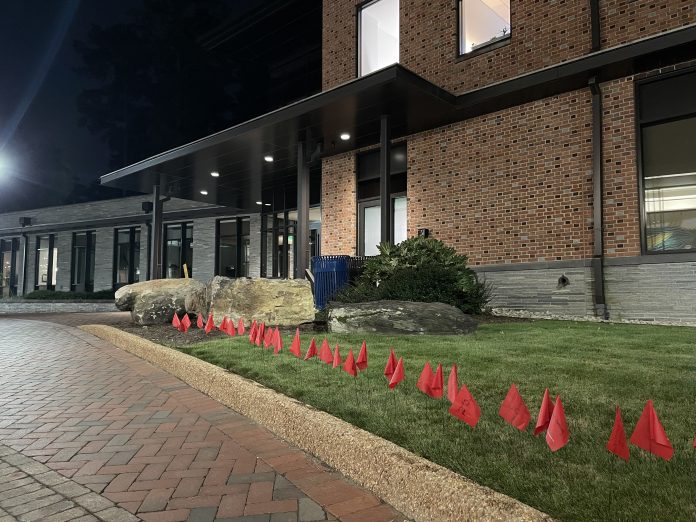Starting Oct. 14, the College of William and Mary’s Office of Health Promotion hosted a week-long sexual assault awareness initiative called the Red Flag Campaign. The campaign aimed to inform students about sexual assault, dating violence and stalking on college campuses to teach them how to spot red flags in their relationships.
The Red Flag Campaign is a national organization that extends its resources to many different campuses across the country and works in partnership with the Virginia Sexual and Domestic Violence Action Alliance to advocate for sexual violence education. The VSDV Alliance works toward more than just dating safety; it facilitates several funds that support survivors of domestic abuse, reproductive freedoms and post-trauma rehabilitation efforts.
The alliance’s website elaborates their mission for healthy relationship and community-building.
“The VSDV Alliance seeks a radically hopeful future and works to promote healthy relationships, create thriving communities, and build a more equitable world by centering racial justice, reproductive justice, and economic justice,” the website reads.
The Red Flag Campaign works at the College to foster healthy relationships and a culture of consent among the community.
According to their website, the Alliance defines consent as “not just about individual actions or behaviors, but rather exist[ing] within all relationship dynamics, cultural beliefs, and larger societal systems. Building a consent culture requires we normalize and encourage the everyday use of consent in all interactions.”
Administrators from the office alongside student volunteers tabled from Monday, Oct. 14 to Friday, Oct. 18. Assistant Director of Health Promotion and Sexual Violence Prevention Specialist Candice Fox said many universities have adopted the Red Flag Campaign and that Someone You Know, a peer education group at the College focused on sexual violence prevention, has been implementing the campaign on campus for several years.
Fox commented on the importance of this campaign and informing students, particularly during October, which is a month dedicated to sexual violence awareness.
“The Red Flag Campaign is a project of the Virginia Sexual and Domestic Violence Action Alliance and was created by college students, college staff, and community advocates,” Fox said in an email. “The Office of Health Promotion has also brought the Red Flag Campaign to the Wellness Center during this awareness month for an entire week hoping to encourage campus-wide participation and facilitation of the campaign.”
The tabling efforts included distributing resources such as fliers which explain how to notice unhealthy relationships at an early stage. Volunteers handed out physical red flags on which students could write their own experiences and stick them into the ground outside of the Mcleod Tyler Wellness Center. This allows students to share potential red flags they have experienced with their peers, anchoring them in a visible spot on campus.
Student volunteer Kat Love ’27 shared her appreciation for the initiative and the importance of educating the student body on potential warning signs they might encounter.
“I think it’s important to have campaigns centered around dating violence/abusive relationships on college campuses because for a lot of students, these are their first formative relationships and it’s important to learn what an unhealthy relationship looks like — and that gives perspective to assess their own,” Love said in an email.
Love expressed their sadness that many students have already suffered through toxic relationships, but emphasized the campaign’s essential role in breaking the cycle.
“I think for many students this campaign was educating but also an outlet to share their own personal experiences with an abusive partner or unhealthy relationship,” they said. “Mostly every student that wrote their own red flag had an example ready to go — and that saddened me. My biggest hope is that we can learn from each other to avoid falling back into abusive cycles or step in to stop them from continuing.”
According to the National Intimate Partner and Sexual Violence Survey conducted from 2016 to 2017, about 45% of women and 41% of men experienced sexual violence, physical violence and/or stalking from an intimate partner between the ages of 18-24.
Fox said that although incidents of sexual violence are inevitable, having the knowledge and the ability to sense when a relationship does not feel safe early on can protect people from dangerous experiences later down the line.
“This campaign encourages friends and other campus community members to say something when they see warning signs for sexual assault, dating violence or stalking in a friend’s relationship,” Fox said. “The best way to avoid is to know. Knowing the red flags of an abusive relationship saves lives and communities.”
The Office of Health Promotion is hosting multiple awareness events this October to honor Domestic Violence Awareness Month. The next one will be the Someone You Know campaign in Crim Dell Meadow Oct. 31, where volunteers plan to educate students on sexual violence prevention and intervention skills.

